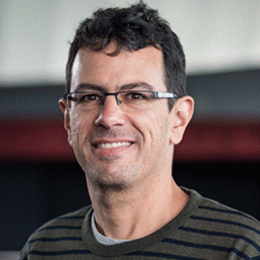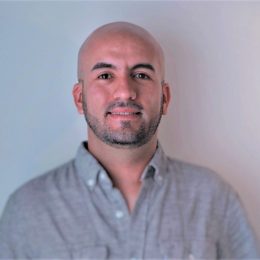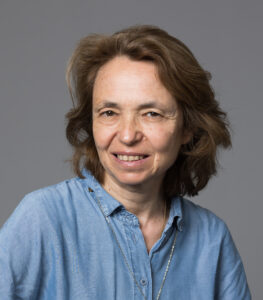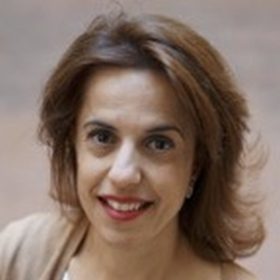Panel Discussions
Status: 17 November 2022
If you see this text you are logged in. This means that in the list below you will see *Reg’d below the names of authors, panel moderators and panellists who are registered, *Reg’d + paid if they have also paid, and *Reg’d – free if that applies. The public will not see this, nor will you, if NOT logged in.
As these remarks are entered manually, there may be some lag in updates.
Panel
Past, present and future of speech technologies in translation

Dragos Ciobanu
Panel Moderator
Panellists:
For bios click picture or scroll down
This panel will focus on current and future implementations of speech technologies in translation. Research has shown that speech technologies (i.e., both speech recognition and synthesis) positively influence the output quality, language professionals’ productivity, and workspace ergonomics associated with translation, revision, post-editing machine translation, audio-visual translation, as well as interpreting processes. Despite these demonstrated benefits, technology providers have been somehow trailing behind in integrating speech technologies into current translation environments, although progress in enhancing subtitling, computer-assisted interpreting, and even complete speech-to-speech translation tools has been more substantial.
In this panel, we will discuss the practical, methodological and educational implications of using speech technologies by professional and trainee translators, and how these technologies impact language professionals and consumers. The panel members will represent both academic and international organisations and will discuss, using a variety of examples from their research, teaching and professional practices, some of the myths, successes, challenges and opportunities of working with speech technologies in translation and related fields.
Univ.-Prof. Dragos Ciobanu, PhD
Dragoș Ciobanu is Professor of Computational Terminology and Machine Translation in the University of Vienna Centre for Translation Studies. He leads the HAITrans research group (Human and Artificial Intelligence in Translation – https://haitrans.univie.ac.at/) and investigates ways to improve localization workflows by integrating translation and speech technologies, as well as methods to optimise collaborative translation and training practices. He collaborates with Language Service Providers from around the world and trains linguists from International Organisations to maximize the use of language, localisation, and project management technologies.
e-mail: dragos.ioan.ciobanu@univie.ac.at | Website: https://tinyurl.com/55yvrc6k
Outline of panel will follow
For biographies of panellists click a picture above or scroll down

Marcin Feder
Marcin Feder
Marcin Feder has a PhD in linguistics (English/Computer Assisted Translation). He worked for Adam Mickiewicz University in Poznań, Poland, and then (in 2003) joined the EP as an in-house interpreter in the Polish booth. Later he became the Head of the PL Unit in DG LINC, and subsequently Head of the Interpreter Support and Training Unit and acting Head of the Multilingualism and Succession Planning Unit. Since 2019, Marcin is the Head of the Speech-to-text Unit in DG TRAD, which is developing on a live speech-to-text and machine translation tool that is able to automatically transcribe and translate parliamentary multilingual debates in real time. The ultimate goal is to provide an automatic transcription and translation service for parliamentary debates covering the 24 official languages used by the European Parliament.

Alina Secara
Alina Secară, MA PhD
Alina Secară is Senior Scientist in the University of Vienna Centre for Translation Studies where she investigates accessibility practices and technologies, and teaches modules related to accessibility and audiovisual translation, as well as multimedia localization processes and technologies. A UK Stagetext accredited theatre captioner, she worked with theatres across the UK to integrate captioning for the Deaf and Hard-of-Hearing audiences, and provided customized hands-on training in subtitling and captioning to EU and UN in-house linguists. She managed the UK University of Leeds MA in Audiovisual Translation Studies for over a decade and was part of a variety of EU-funded e-learning translation technologies projects such as eCoLoTrain, eCoLoMedia and DigiLing.
e-mail: alina.secara@univie.ac.at | Website: https://tinyurl.com/4sfd3568

Carlos da Silva Cardoso Teixeira
Carlos Teixeira
Carlos Teixeira has a passion for languages and is an expert in translation technologies and processes. He works as a localisation engineer for IOTA Localisation Services, Dublin, helping to optimise the translation workflows for their high-profile customers mainly in the software industry. Carlos had previously been active in the language industry as a specialised translator from English, French and Spanish into Brazilian Portuguese. He has bachelor’s degrees in Electrical Engineering and Linguistics as well as a PhD in Translation and Intercultural Studies from Universitat Rovira i Virgili (Spain) and Katholieke Universiteit Leuven (Belgium). He was a post-doctoral researcher in the field of translation technologies at Dublin City University and the ADAPT research centre, focussing on the ergonomics of translation environments for professional translators. He also teaches in the Master’s in Professional Translation at Universitat Rovira i Virgili.

Julian Zapata
Julian Zapata
Dr. Julián Zapata is a certified translator, a translation researcher, and an entrepreneur. He was recently appointed as Assistant Professor of Translation at the Toronto Metropolitan University.
As a young boy, Julián discovered a fascination for anything related to languages and effective communication, from reading and writing poetry, to taking part in his high school’s public speaking competition. He grew up speaking Spanish and began learning foreign languages at teenage, in Canada, when he decided to pursue a career in translation.
He completed his PhD in Translation Studies (2016) at the University of Ottawa, where he also taught, for nearly a decade, an array of courses including English, Spanish and French translation; terminology and terminotics; translation technology and professional aspects of translation, both at the undergraduate and graduate levels. He was also a part-time professor at Université du Québec en Outaouais and Concordia University for several years.
Dr. Zapata has worked internationally in several projects related to translation process research, language and translation technologies, as well as translator training, with several publications and dozens of presentations, guest lectures and plenary speeches in more than 25 countries in Europe, Asia, Africa, the Middle East and the Americas. His research has been funded, notably, by the Social Sciences and Humanities Research Council of Canada, the Fonds de recherche du Québec – société et culture, and Entreprise Ireland.
PANEL
YourTerm: A Collaborative & FAIR European Project

Rodolfo Maslias
Co-Author
and
Chair of the Panel
Panellists:
For bios click picture or scroll down
| In 2021, the University of Padova (UNIPD) together with the Aristotle University of Thessaloniki (AUTH), the Institute of Intercultural Management and Communication (ISIT) of Paris, and TermCoord have worked together for the design, implementation, and testing of a new collaborative multilingual terminological management system (TMS), named FAIRterm, to support the work of the terminologists in the “Terminology without Borders” project. FAIRterm is the first terminological application designed in order to meet the FAIR principles and implemented according to the de iure ISO TC/37 SC/3 standards currently in force for terminology management. In this panel, we want to discuss the challenges of this project from technical and pedagogical perspectives, such as: the integration of FAIRterm in CAT tools, the reliability of terms produced within a collaborative platform, the validation of the terminological workflow, the intercultural and technical challenges for the coordinators of the projects. |
Rodolfo Maslias
Founder and Head of the Terminology Coordination Unit of the DG for Translation of the European Parliament since 2008. Before, since 1981, translator in the Greek Translation Unit. Visiting Professor in the University of Luxembourg since 2013 and more recently in many Universities teaching terminology in English, French, Spanish, German, Italian and Greek. Member of several boards and scientific committees. He has been Head of Cabinet of the Greek Minister of Culture and cultural advisor to the Mayor of Athens and is active in cultural management. He has published books and e-books on terminology and culture as well as philosophical essays and poems.
In this panel, we want to discuss the challenges of this project from technical and
pedagogical perspectives, such as:
• How to integrate the FAIRterm resource in CAT tools?
• Would it be possible to integrate an on-the-fly search of terminological records into a
Computer Assisted Interpreting tool?
• Would it be possible to search for relevant terms and automatically update the
translation memory files of the translators at EU?
• Could a terminological management system be used to autocomplete/suggest queries
during the translation process?
• How reliable are the terms produced within a collaborative platform and how to
avoid/manage duplicate records?
• How can we assure a correct validation of the terms if more users are working on the
same record?
• What are the factors to consider when coordinating a collaborative project in an
academic environment?
• How students reacted to the new tool in a UX design perspective, and did it facilitate
their collaboration?
• What are the intercultural and technical challenges for the coordinators of such
projects?
• How to enhance students critical thinking ability toward their terminological work as a
whole, and toward the terminological management tool in particular?
• How to help students have a good view of the needs of the European users of the
terminological resources they build and adapt to these needs.
• When shall a tool oriented collaborative terminological project be proposed to
students in a global terminological and translation training?
For a more detailed overview of YourTerm and this Panel, refer to the Extended Abstract which was provided to AsLing when the proposal for this panel was submitted.
For biographies of panellists click a picture above or scroll down

Giorgio Maria Di Nunzio
Giorgio Maria Di Nunzio
Giorgio Maria Di Nunzio is Associate Professor at the Department of Information Engineering of University of Padua. His main research interests are: Interactive Machine Learning, Medical Information Retrieval, Open Data Science. He is currently Member of the Technical Scientific Committee and Representative of the University of Padua Digital Library and the Open Science initiative of the University of Padua Library System.
He is currently co-editor in chief of the journal Umanistica Digitale and Associate Editor for four top international journals. He has been the Secretary of the Associazione per l’Informatica Umanistica e la Cultura Digitale (AIUCD) from 2018 until 2020.

Pascale Elbaz
Pascale Elbaz
Pascale Elbaz got her PHD in History of Chinese thoughts from Inalco, the famous French School of Oriental Languages. She is now working as an Associate Professor and Researcher at ISIT International School in Paris and an Associate Researcher at IFRAE. Her research spans the history of Chinese thoughts, the Modern Chinese vocabulary and the didactic of translation and terminology in the digital era. She directs master’s thesis in terminology and co-directs thesis on the pedagogy of translation.

Elpida Loupaki
Elpida Loupaki
Elpida Loupaki, is an Assistant Professor in Descriptive Translation Studies & Terminology, at the School of French, Aristotle University of Thessaloniki.
Her research interests lie in the areas of the Terminology Management; EU translation; News Translation; Translation and Ideology. From 2013, she had coordinated a dozen of terminology projects in cooperation with the TermCoord. She has extensive professional experience as free-lance translator, reviewer, and worked in the post-editing of ISO standards.
She is, among others, a member of the EST, a member of the Board of the Hellenic Society for Terminology and President of the Hellenic Society for Translation Studies.

Federica Vezzani
Federica Vezzani
Federica Vezzani is assistant professor – RTDa – at the Department of Linguistics and Literary Studies of the University of Padua. Her main research interests are: Terminology, Terminography and Specialized Translation. In particular, she focuses on the management of multilingual terminology according to ISO standard for terminology, and she has developed the FAIR terminology paradigm for the optimal organization of findable, accessible, interoperable and reusable terminological data. She has been the recipient of a Marie Skłodowska-Curie Actions (MSCA) Individual Fellowships (IF) grant and author of the book “Terminologie numérique : conception, représentation et gestion” published by Peter Lang publisher in 2022.




